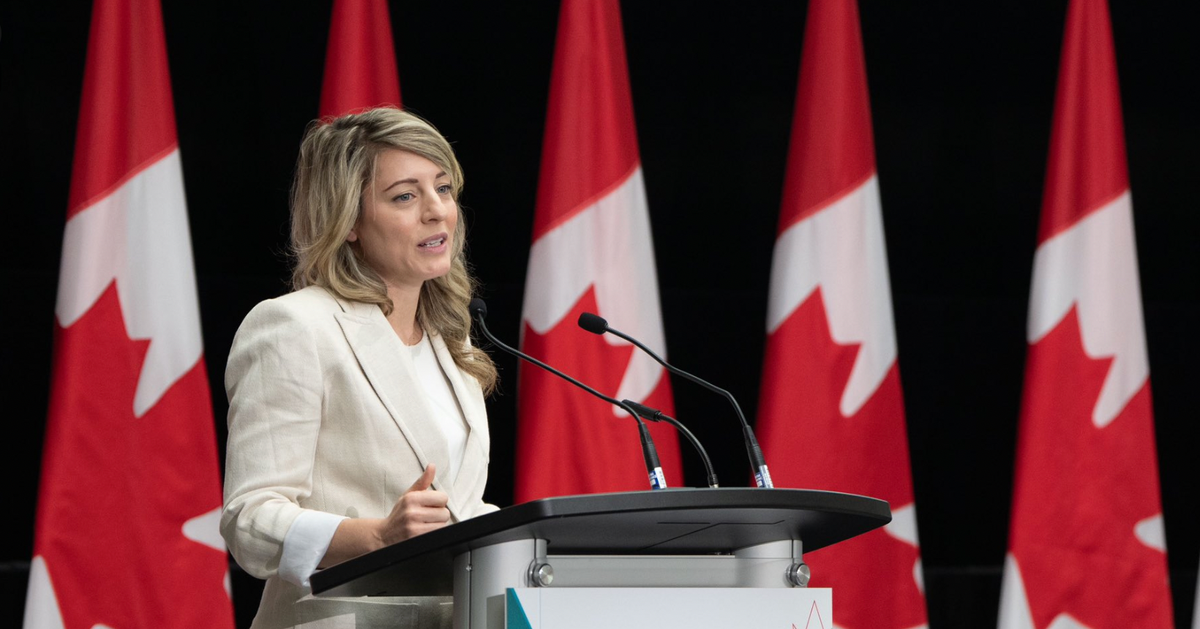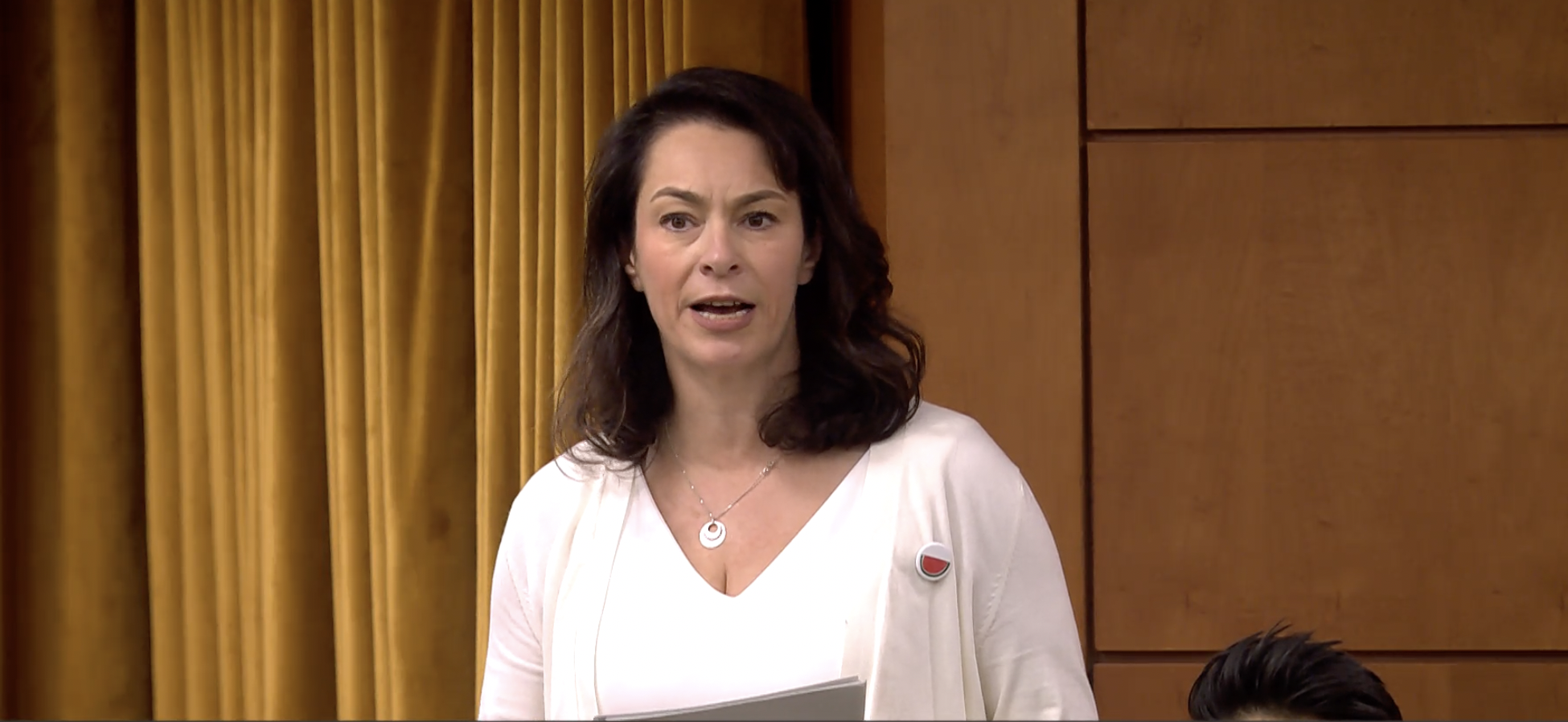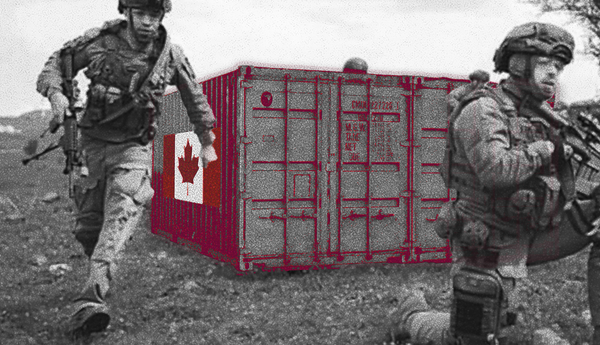On March 18, NDP foreign affairs critic Heather McPherson rose in the House of Commons to deliver an impassioned speech in support of her party’s wide-ranging motion calling on the government to support Palestinian human rights in the midst of Israel’s assault on Gaza.
“The failure of Canadians to face this horror is shameful. It is not political inaction, but complicity, and it does not have to continue […] This is not complicated,” McPherson said.
“Day after day, week after week, New Democrats have demanded that the government pursue peace and justice, while in Gaza the bombs continue to fall. How many more bombs must fall? How many more children must die before the government finally does what is right?”
Throughout her speech and in the ensuing debate, McPherson quoted Palestinian poets Refaat Alareer, who Israeli forces killed last December in an air strike on his home, and Mahmoud Darwish, as well as Palestinian-American historian Rashid Khalidi.
The original text of the motion called for the recognition of Palestinian statehood, an “immediate ceasefire” and release of hostages, a two-way embargo on trading all “military goods and technology” with Israel, banning extremist Israeli settlers from Canada and sanctioning Israeli officials who incite genocide, and supporting the work of the International Criminal Court (ICC) and International Court of Justice (ICJ) to prosecute human rights abuses by Israelis and Palestinians.
A March 19 Globe and Mail report falsely claimed the original motion “included no language condemning Hamas.” In fact, the original text condemned Hamas five times.
Ultimately, substantial last-minute changes made in exchange for the government’s support led to MPs voting on an entirely different motion than the one they spent the day debating.
The amended motion, which passed easily, dropped calls for the immediate recognition of Palestinian statehood and sanctions on Israeli officials who incite genocide, added a call for Hamas to surrender to Israel as part of a ceasefire, and watered down the arms embargo to apply strictly to “further authorization and transfer of arms exports to Israel.”
McPherson told The Maple that she completely stands by the motion as debated, but was pleased to have received government commitments on key areas while facilitating a national and international debate on how Western countries can support Palestinian human rights.
“There’s a potential genocide happening. This is not the issue to create a wedge on. This is the issue where you have to try to get as many people as you possibly can working in the same direction,” McPherson said in an interview at her Edmonton-Strathcona constituency office.
On March 27, the same day The Maple spoke to McPherson, 134 U.K. parliamentarians from Labour, the Scottish National Party and Conservatives wrote a letter to Foreign Secretary David Cameron calling for an arms embargo on Israel, explicitly citing the Canadian government’s support for the motion.
U.S. Sen. Bernie Sanders and Rep. Ilhan Omar similarly presented the Canadian language on arms exports as a model to emulate.
“I don’t think media would still be covering the story a week later” if the motion had failed, McPherson added.
“We would have gotten home on Monday night and that conversation would have been over. Instead, the ripples of Monday are happening around the world. If this motion plays even a tiny little drop in the bucket of something that will lead to change, why wouldn’t we do that?”
But critics question whether the final motion’s wording commits the Canadian government to anything it hasn’t already promised.
A Last-Minute Compromise
The substantial changes to the motion were the culmination of a process that began in the days leading up to the debate in the House.
The NDP motion was originally slated for debate on March 1, but this was rescheduled to March 18 due to the death of former prime minister Brian Mulroney on February 29.
The Liberals agreed to restore funding to the United Nations Relief and Works Agency (UNRWA) for Palestinian refugees on March 8, which they suspended in January after the Israeli government made unsubstantiated claims that 12 of its staff participated in the Hamas-led October 7 attack on Israel.
Restoring funding was one of the actions the motion called on the government to take. But Ahmed Hussen said the government’s decision came after U.S. Ambassador to the United Nations Linda Thomas-Greenfield “implored” the Canadian government to do so.
While the Liberals had almost three weeks to discuss amendments to the motion with the NDP, it took until March 15 for Foreign Affairs Minister Mélanie Joly to call McPherson to discuss the motion. But Joly proposed no amendments.
The following day, according to reporting in the National Post, the Liberal cabinet held an emergency meeting to discuss its position while NDP House leader Peter Julian and government House leader Steven MacKinnon discussed proposed amendments over the weekend. These conversations continued into Monday.
“When the Liberals first came back with some amendments for us, we basically were laughing at them. It was absurd,” McPherson told The Maple.
According to McPherson, the government wanted to entirely remove the motion’s sections on the arms trade, international courts and sanctions. She identified the first two of these items in particular as the “most meaningful” aspects of the motion, so direct discussions with the governing party stalled.
With the support of all 25 New Democrats in the House, 32 Bloc Québécois MPs and both Greens, the original motion would have required 111 Liberals to reach a majority of votes in the House if no MPs abstained.
In a March 27 Globe and Mail story based on background conversations with 11 Liberals, New Democrats and civil society organizations, Marieke Walsh reported that 70 Liberal MPs planned to vote in favour of the original NDP motion, with the government anticipating an increase in that number to between 80 and 90.
This would have constituted more than half of the Liberal caucus — and a significant embarrassment to the government.
In the evening, Joly, who dodged questions from both the NDP and Conservatives about whether the government supported or opposed the motion during the House debate, “hunted me down in the opposition lobby” to reach a compromise on the motion’s wording, McPherson told the Post.
The amendments were agreed upon just 20 minutes before the scheduled vote on the motion.
“It was fast, but there was a lot of discussion about what this could look like. The big changes weren’t the last-minute changes, to be perfectly honest,” McPherson told The Maple.
The motion ultimately passed with 204 votes in favour and 117 against, with Liberal MPs Anthony Housefather, Marco Mendicino and Ben Carr joining the Conservative caucus and independent MP Kevin Vuong in voting against it.
Rather than vote against the final motion’s substance, its opponents objected to it on procedural grounds, arguing that MPs didn’t have sufficient time to review the substantial changes made to its text.
According to the Globe, the Liberals and NDP “left their caucuses in the dark on the substance of the pending amendments.”
McPherson declined to comment on how the NDP caucus was informed of the amendments.
Outside Pressures
At some point on March 18, Prime Minister Justin Trudeau spoke on the phone with Benny Gantz, an opposition member of the Israeli government’s war cabinet who is seen by many Western leaders as a more palatable alternative to Prime Minister Benjamin Netanyahu.
After the initial round of debate over the NDP motion, Gantz posted on Twitter that he told Trudeau that recognizing a Palestinian state would be “counter-productive to the mutual goal of long-term regional security and stability, and would ultimately reward terrorism.”
Canada’s preeminent pro-Israel lobbying outfit, the Centre for Israel and Jewish Affairs (CIJA), took credit for ensuring the motion didn’t recognize a State of Palestine, but was still aghast that the Canadian government passed a motion critical of Israel.
“We are angered and deeply disappointed that the Liberal government has chosen to effectively sub-contract Canadian foreign policy to anti-Israel radicals within the NDP and the Bloc Québécois,” CIJA CEO Shimon Koffler Fogel wrote in a statement, which lauded the “principled stance” of the Conservatives and outlier Liberals on behalf of the “Canadian Jewish community.”
The Israeli government and its supporters weren’t the only outside forces attempting to influence the vote’s outcome. Some civil society organizations who were broadly supportive of the motion leaned on the NDP to find a consensus with the Liberals while others cautioned against taking this route.
The Globe reported that a “main driver” in getting the NDP to accept significant amendments to its motion was pressure from some Muslim and Palestinian groups who wanted to ensure that something was passed, even if it meant fundamentally altering the text.
The National Council of Canadian Muslims (NCCM) reportedly played a particularly key role — confirming what sources told The Maple on background.
The NCCM told The Maple that its CEO, Stephen Brown, was travelling and unavailable for an interview, asking for a list of questions to which the NCCM could respond with a written statement. The organization didn’t respond to The Maple’s written inquiries.
At a March 19 press conference, Brown praised the “historic moment of collaboration” that led to the motion’s passage.
The Globe piece cited Canadians for Justice and Peace in the Middle East (CJPME) and the liberal Zionist organization JSpace Canada, which is critical of many Israeli policies, as two other organizations who played a major role in consultations on the original motion.
A source close to JSpace told The Maple that the group attempted to convince Liberals to vote for the original motion.
JSpace published a policy brief in February, co-authored by interim chair Maytal Kowalski and former Canadian ambassador to Israel, Jon Allen, specifically calling for recognition of Palestinian statehood, “despite no such recognition by Israel.”
This would, they argued, “help accelerate a much needed diplomatic process to revive two-state negotiations.” McPherson referenced this report in her speech that introduced the motion.
Kowalski initially agreed to an interview with The Maple about the motion, but then backtracked.
“I get the sense of where you’re going with the piece, and I don’t think we’re the best folks to talk to,” Kowalski said in an email, adding that she didn’t want to pit Liberals against New Democrats.
After the motion passed, JSpace issued a statement to “applaud” the outcome.
“We were heartened to see not only the motion brought forward, but the impassioned debate that took place throughout the day preceding the vote,” the statement read.
The organization identified opposition to West Bank settlements, sanctioning extremist West Bank settlers and refunding UNRWA as major priorities that were reflected in the final motion.
Michael Bueckert, vice-president at CJPME, told The Maple that the advocacy group supported the original motion, but played no role in conversations leading up to its late February introduction.
An NDP staffer reached out to Bueckert relatively early on March 18 to inform him the NDP was in negotiations with the Liberals about the motion’s final wording and that they may be willing to make some changes to ensure it passed. However, Bueckert recalled that it sounded as if the two sides were far apart.
“We didn’t want it to be a situation where the motion gets passed by Parliament, but it basically affirms existing Canadian policy,” he said.
“We certainly didn’t recommend a compromise and warned about the possibility of a motion passing that actually doesn’t mean anything.”
The next time Bueckert heard from the NDP, they had agreed to the Liberals’ proposed amendments.
While he advised against the NDP taking the tactical approach they did, Bueckert shares McPherson’s view that getting the government to commit to pausing permits for future arms exports to Israel is itself a significant achievement.
“Not just from a domestic perspective, but if we widen our scope at the international level, this is potentially putting pressure on other countries to follow suit,” he explained.
Independent Jewish Voices (IJV), an anti-Zionist group, confirmed to The Maple that it was consulted after the motion was brought forward and kept abreast of developments by McPherson’s office.
IJV executive director Corey Balsam said it was “disappointing […] the government managed to save face and get away with only a few small steps in the right direction.”
The motion as passed, Balsam said, is “significant, especially given the Canadian government’s radical pro-Israel positioning over the past decades, but it’s inadequate.”
Has The Policy On Arms Exports Changed?
Heidi Matthews, an international legal scholar at York University’s Osgoode Hall, said she’s unconvinced that the amended motion commits the Liberals to anything they weren’t already doing, with much of its language giving the government significant flexibility in its interpretation.
“I’m not sure anything significant was achieved here. I know that’s a cynical position, but I think that it’s equally plausible as the more optimistic position,” she said, adding that she hopes to be proven incorrect.
Nowhere is this linguistic flexibility more evident than with the changed language on the arms trade, Matthews explained.
The original motion was unambiguous in its call for the suspension of “all trade in military goods and technology with Israel.” The updated version, however, calls on Canada to “cease further authorization and transfer of arms exports to Israel.”
As The Maple previously reported, the government chose not to apply this to existing military export permits that were issued before January 8.

The change of terminology to arms from military goods is significant, since the Canadian government has maintained that the $28.5 million in military exports it approved to Israel in the first two months after October 7 aren’t arms sales because the goods are “non-lethal” — a legally meaningless term that doesn’t appear anywhere in the Export and Import Permits Act.
“What constitutes an arm? Arms, for the purposes of this motion, are completely unclear,” Matthews said.
The week before the NDP motion was debated, the Toronto Star reported that Canada stopped approving all new military export permits to Israel on January 8.
But McPherson suspects that is not actually the case, given the Liberals’ recent efforts “to wiggle out of being accountable for what is still getting shipped to Israel.”
“We need to get them on the record saying things and then we need to do the work, because as has been pointed out many times, this is a non-binding motion,” McPherson said.
One Word Can Make A Big Difference
A March 24 CBC analysis piece from journalist Evan Dyer speculated that the motion’s language on prosecuting war crimes in the conflict could represent a “profound shift in Canadian foreign policy.”
“I was actually surprised that part stayed in the motion,” Mark Kersten, an international legal scholar at the University of Fraser Valley whom the NDP consulted on the motion, told Dyer.
Kersten called it “one of the few things that I think is a diametrical shift in what the Liberals have said in the past, or what the government has ever said in the past.”
But Matthews said the removal of a single word from the original motion gives the Liberals major leeway.
The original motion called on Canada to “support the prosecution of all crimes and violations of international law committed in the region, and support the work of the International Court of Justice and the International Criminal Court [emphasis added].”
The amended version eliminates “and,” separating the prosecution of crimes and international law violations in the conflict from a generalized statement of support for the ICJ, which prosecutes states, and ICC, which prosecutes individuals.
“I’m not sure at all that the motion is saying that it’s going to support the work of the ICJ and the ICC with respect to the prosecution of crimes and violations of law committed by Israel,” Matthews said, calling their “decoupling [...] dangerous.”
This distinction would be consistent with the prime minister’s response to South Africa bringing its genocide case against Israel to the ICJ, which the ICJ ruled is “plausible.”
“Our wholehearted support of the ICJ and its processes does not mean we support the premise of the case brought forward by South Africa,” Trudeau said in January.
McPherson harbours no illusions about the challenge of holding the Liberal government to the commitments it made on March 18, but maintains the amendments were worth it to get the Liberals on the record supporting an immediate ceasefire, halting the authorization of future arms export permits to Israel and endorsing efforts to hold Israel and Palestinian militants accountable in international legal fora.
“We have turned the page in a way that I think means going forward, Canadians are going to expect that the federal government has a more reasonable, more balanced approach to peace in the Middle East,” she said.
Jeremy Appel is an independent Edmonton-based journalist and the author of Kenneyism: Jason Kenney’s Pursuit of Power.








